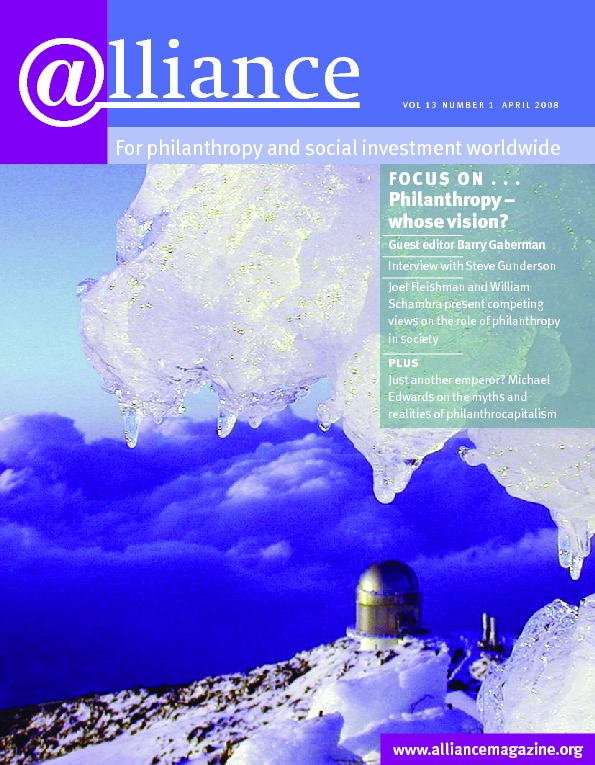 In 2004, the Chinese government enacted a Regulation on Foundation Administration which allows individuals, including foreigners, to establish private foundations with their own capital contributions. The People’s Daily, the organ of the Central Committee of the Communist Party of China, describes Chinese private foundations as a ‘new generation of civil philanthropy’.
In 2004, the Chinese government enacted a Regulation on Foundation Administration which allows individuals, including foreigners, to establish private foundations with their own capital contributions. The People’s Daily, the organ of the Central Committee of the Communist Party of China, describes Chinese private foundations as a ‘new generation of civil philanthropy’.
Not only are they among the first officially sanctioned NGOs to be able to operate autonomously, but as grantmakers they are proving instrumental in improving the eco-environment of China’s NGOs in general.
China operates a dual registration system for NGOs. To establish a new NGO, you have to seek approval from a government regulatory department as well as registering with the civil affairs department, which explains why most of China’s NGOs have close ties with government. These NGOs raise over 10 billion RMB each year, which goes mainly to education, poverty reduction, healthcare, help for those with disabilities, and disaster relief.
In the transition from state control to non-governmental status, these NGOs are gradually developing into three kinds of organization. Most simply become almost inactive, because they don’t know how to manage the organization without all the administrative resources they had previously. A few still make use of government’s power and influence to collect compulsory donations from enterprises, which has damaged the purity of civil philanthropy. And a handful become outstanding performers, such as China Youth Development Foundation (CYDF), which has constructed over 13 thousand Hope primary schools and helped over 3 million poor rural children go to school since it initiated Project Hope 18 years ago.
Besides these quasi-state NGOs, there are also a large number of grassroots NGOs for whom life has been much harder. First, without a government background and unable to obtain approval from a government regulatory department, some of them have had to register with the administrative department for industry and commerce as businesses. Second, over 90 per cent of non-government charity donations in China are monopolized by state-run NGOs, which has excluded grassroots NGOs from local resources and the legitimacy these confer and thus forced them to seek overseas support instead. This has made it difficult for them to take root.
The 2004 Regulation on Foundation Administration, which allowed individuals to establish foundations, altered the situation. In a short period of two to three years, over 300 private foundations funded by corporations and individuals emerged nationwide, accounting for about a third of the total number of foundations in China. At the same time, over ten representative offices of foreign foundations, including the Bill & Melinda Gates Foundation, have been set up in China.
Private foundations are the first non-governmental organizations that have been able to avoid the dual registration difficulty. Take the Narada Foundation, of which I am the Chief Executive Officer, which is funded by a private corporation. When it was established in 2007, the Ministry of Civil Affairs became both its regulatory body and its registration body. In other words, the establishment of non-profit foundations can be approved by civil affairs units once and for all without the need for further approval from other government departments.
In addition, private foundations are generally grantmaking organizations, which breaks the monopoly of state-run NGOs over philanthropic resources and allows grassroots NGOs to share local resources. For example, the Narada Foundation launched a New Citizen Programme to make grants for grassroots NGOs that focus on the education of migrant children, and to set up New Citizen Schools; while the mission of the China Social Entrepreneur Foundation (You Cheng) is supporting Chinese social enterprises.
In government-led and sponsored NGOs, the government rather than the NGO board dictated policy, whereas in today’s private foundations, the board is in control, which makes NGO governance more efficient. In short, China finally has truly independent NGOs.
Xu Yongguang is the Vice Chairman and Secretary-General of the Narada Foundation. Email xuyongguang@gmail.com





Comments (0)